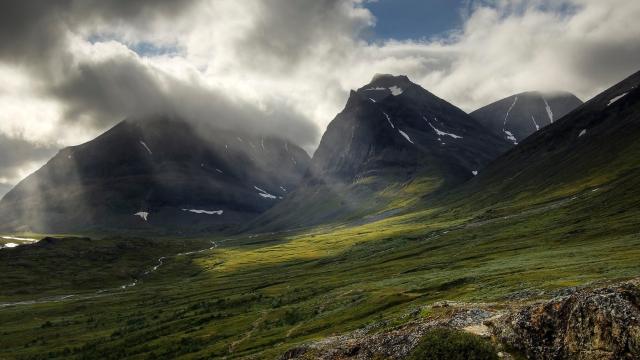Sweden may have to follow Iceland’s lead in holding a funeral for the dying ice atop Kebnekaise, the nation’s former tallest peak. Scientists have confirmed that the title of Sweden’s highest point has changed hands, after two blistering summers eroded the glacier capping the mightiest mountain in the country.
Kebnekaise is a two-peaked mountain that sits just above the Arctic Circle. The region has been battered by back-to-back hotter-than-average summers. Researchers measured the glacier on the summit of the southern peak ” which until this year was just ahead of the north peak as Sweden’s highest point ” last year and found it was shrinking. It appeared likely that it would dip below the northern peak, but researchers’ weren’t able to take accurate enough measurements by summer’s end.
Unfortunately, they got a second chance this year amidst a sizzling, smoke-clogged summer. Heat waves racked Europe and fires lit up the Arctic. With their measurement this year, researchers at Stockholm University confirmed the southern peak, at 2,095.6 metres tall, had shrunk to become 1.2 metres shorter than the northern. While it may accumulate some snow and ice this winter to temporarily reclaim its crown, it likely won’t return to its former glory.
“This is the lowest height ever measured,” Gunhild Ninis Rosqvist, a geography professor at Stockholm University, said in a statement. “Over the past 50 years, the height of Kebnekaise’s southern peak has decreased by 24 metres.”
The heat waves that baked Europe over the past two summers have been directly linked to climate change, and this year’s had the added oomph of coming amidst the hottest month in recorded history for the planet.
While there were obviously more serious impacts from the record heat, such as the deaths of roughly 1,500 people in France or billions of tons of ice falling into the ocean off Greenland, Sweden’s shrinking mountain is a reminder that climate change means everything changes.
And it highlights the plight of mountain ice everywhere, as meltwaters go from a trickle into a raging river. Sweden relies on hydropower as its main source of energy, and melting glaciers could have an impact. Other countries from Peru to Nepal are worried their disappearing ice could hurt farmers and power production while also raising the risk of violent torrents known as glacial lake outburst floods.
Sweden’s geological oddity is indicative of much bigger problems and risks that could result in more than just a funeral for disappearing ice.
